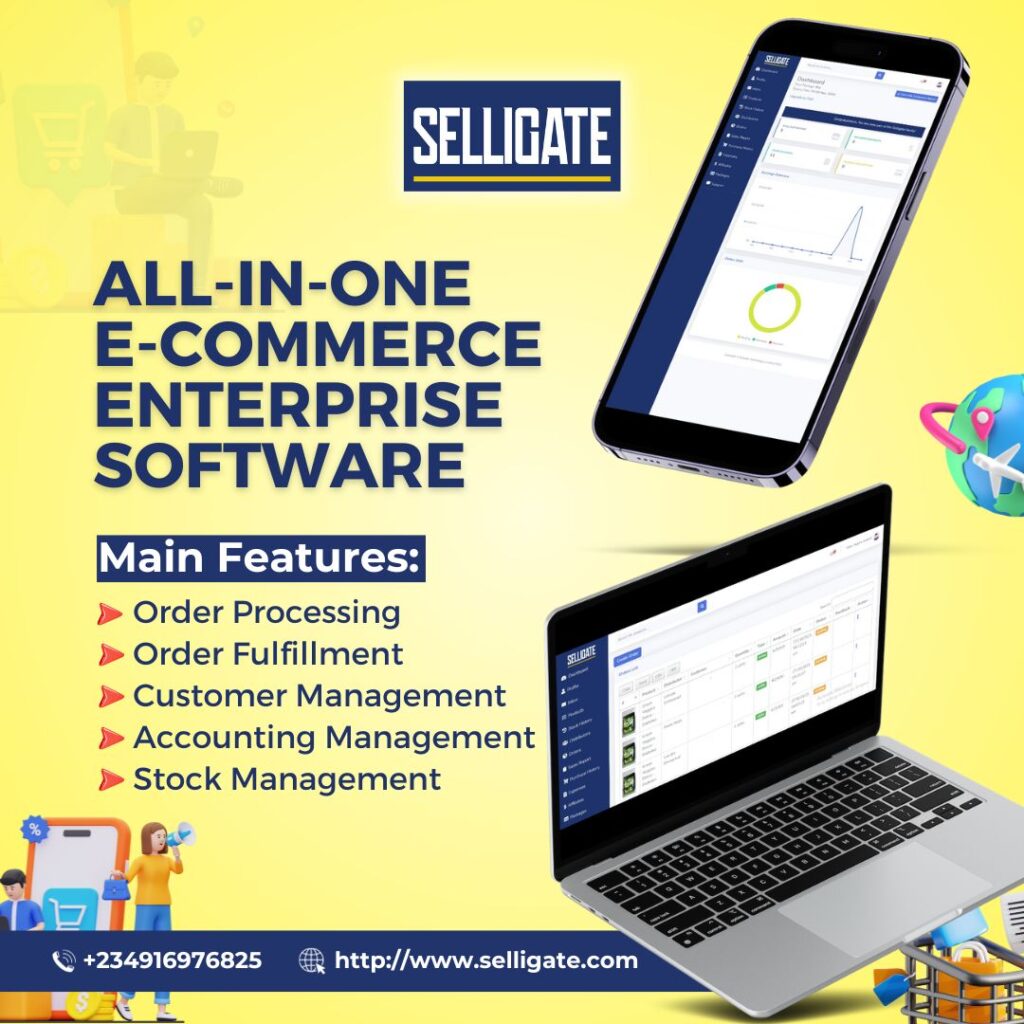
E-commerce Business in Nigeria is a goldmine if you can successfully set it up. In Nigeria, the e-commerce value chain is worth US$ 8.8 billion and you wonder what it takes to tap from this huge wealth of e-commerce business in Nigeria.
However, your reason to start an e-commerce business should not be solely centered on making money, but it should be centered on solving a problem for your customers.
Speaking about ‘your customers,’ there are different types of e-commerce businesses you could start. It is important to understand the types of e-commerce businesses before you can set one up. We have six types of e-commerce businesses but we will consider four. They are:
- Business-to-customer (B2C): This is a common business model, where you sell products or services directly to consumers. Examples of B2C Businesses in Nigeria include Injina Nigeria Limited, GIG Logistics, Jumia, Slot, Dominos Pizza, SoFresh, and Bolt.
- Business-to-business (B2B): A B2B business sells products or services to other businesses. Examples include Alibaba, Quill, Grainger, and Amazon Business.
- Customer-to-customer (C2C): A customer-to-customer (C2C) business model is a type of commerce where customers trade goods and services with each other. Examples of C2C businesses include Jiji, eBay, Craigslist, Etsy, and Airbnb.
- Customer-to-business (C2B): A customer-to-business (C2B) model is a type of business model where consumers provide products or services to businesses in exchange for payment or other benefits. Examples of C2B are freelance websites such as Fiverr and Upwork.
Steps to Start an E-commerce Business in Nigeria
In this article, we will focus on how to start an e-commerce business in Nigeria with our major focus on how to start a B2C business. Launching an e-commerce business in Nigeria involves the following six steps:
- Determine your Product and Target Audience
- Write a Business and Marketing Plan
- Register your Business Name and Open a Bank Account
- Create a Strong Brand Identity
- Choose a Distribution Partner
- Launch Your Business
1. Determine your Product and Target Audience
Pick a Product
We expect that you already have a very good idea of the products you want to sell. However, if you don’t, begin by researching a good product(s) you want to sell. Avoid choosing products that nobody wants to buy. You could do this by carrying out market surveys or seeking expert advice from a Product Manager.
Find your Target Audience
Who needs your products? Create a buyer persona to record important information about your ideal customers. Your buyer persona helps you determine who your target audience is and where you can find them.
2. Write a Business and Marketing Plan
Your business is as good as dead if no one knows about it. Your goal in this step is to ensure you get your business in the faces of your target audience. Writing a business plan guides you to start your e-commerce business in Nigeria. This process entails the following:
- Conduct Thorough Market Research
Do you have competitors? You most likely do. Assess your competitors’ strengths, weaknesses, and market positioning. Identify gaps in the market that your business can address in a unique and much better way than your competitors. Identify how you can make your product better.
- Develop a Marketing Plan
Utilize Digital Marketing Channels
Leverage digital marketing channels like social media, search engine optimization (SEO), and email marketing to reach your target audience and drive traffic to your online store. You may need to run ads and engage in content creation to retain your customers in the course of your e-commerce business.
- Engage in Content Creation
Content Creation helps you to attract and engage customers, establish brand authority, and achieve your overall business goals. Effective content creation can help:
- Enhance Brand Awareness and Recognition
- Drive Traffic and Generate Leads
- Educate and Inform Customers about your Product
- Nurture Customer Relationships to mention a few.
3. Register your Business Name and Open a Bank Account
Register your Business Name
As long as you run an e-commerce business in Nigeria, you will need to register your business with the Corporate Affairs Commission (CAC) at some point to operate legally and protect your brand.
You need to avoid operating with a business name that has already been registered and the only way to verify is to register your e-commerce business name with CAC. Visit the official website to read the requirements and register.
Note: CAC advises that you prepare 3 suggestions for your business name.
Open a Business Bank Account
After registering your business name with CAC, the next step is to separate your business finances from personal finances, ensuring transparency and facilitating tax compliance.
4. Create a Strong Brand Identity
Create a strong brand identity that differentiates your business from competitors and resonates with your target audience. This entails:
- Establishing a strong mission statement
- Choosing a unique logo and
- Setting up your Online Presence
Set up your Online Presence
Setting up your online presence is very crucial to your visibility goals as an E-commerce Business in Nigeria. This entails setting up your social media channels and e-commerce website.
According to Statista, 70% of Nigerian e-commerce businesses use social media to sell their products and services. Of those businesses, 40% said that social media is their primary sales channel. Social media channels such as Facebook, WhatsApp, and Instagram are used by 80% of Nigerian e-commerce businesses. Drive sales and visibility online by setting up your social media channels and using social media automation tools to manage your interactions with your customers.
Set up your E-commerce Website
You may not need a website immediately to start an e-commerce business in Nigeria, as you can utilize popular social media channels to run your e-commerce business. However, as you begin to scale, you will need to set up a website to efficiently manage your customers.
If you do not have a website, you could use SELLIGATE to efficiently manage all aspects of your e-commerce business from order fulfillment to payments.
5. Choose a Distribution Partner
- How do you quickly deliver your products to customers in different cities and states in Nigeria?
- How do you manage disruptions such as returned goods and failed deliveries?
These are questions you must critically think about before you start an e-commerce business in Nigeria. To provide exceptional customer service while running an e-commerce Business in Nigeria, you must develop an efficient order fulfillment system. This entails selecting a delivery and distribution system to ensure your products reach your customers. This step allows you to realize the cost of delivery of the products you sell.

Read Also: How You Can Deliver Your Products within 3 Hours Using Selligate
6. Launch Your Business
In your final preparations, ensure to develop responsive communication channels and stipulate returns and refund policies.
Develop Responsive Communication Channels
Ensure easy accessibility for customer inquiries and complaints. Respond promptly and professionally to build trust and loyalty.
Implement a Returns and Refund Policy
Establish a clear and fair returns and refund policy to address customer concerns and maintain customer satisfaction.
Selligate has a hyper-model distribution system that saves your e-commerce business 100% of the costs incurred on returned goods and failed deliveries.
When you adopt these six steps, you will successfully start your e-commerce Business in Nigeria.
Conclusion: Running an E-commerce Business in Nigeria
Shopify believes e-commerce businesses should forget about profit in their first year of operations but hey, who says you cannot make huge profits in your first year of running an e-commerce business in Nigeria?
Running a successful e-commerce business in Nigeria is exciting and sure has its own challenges but it does not mean it cannot be a profitable venture for you.
While the success of your e-commerce business depends on your decision-making process and resilience, this guide 6 Steps to Successfully Start an E-commerce Business in Nigeria will help you begin the process. embrace the learning process.

